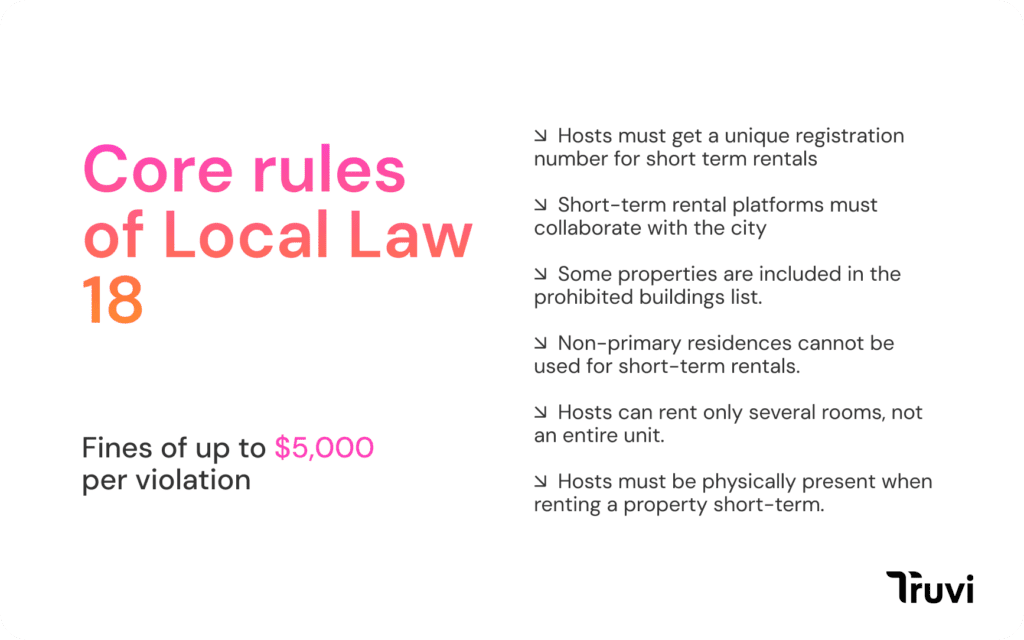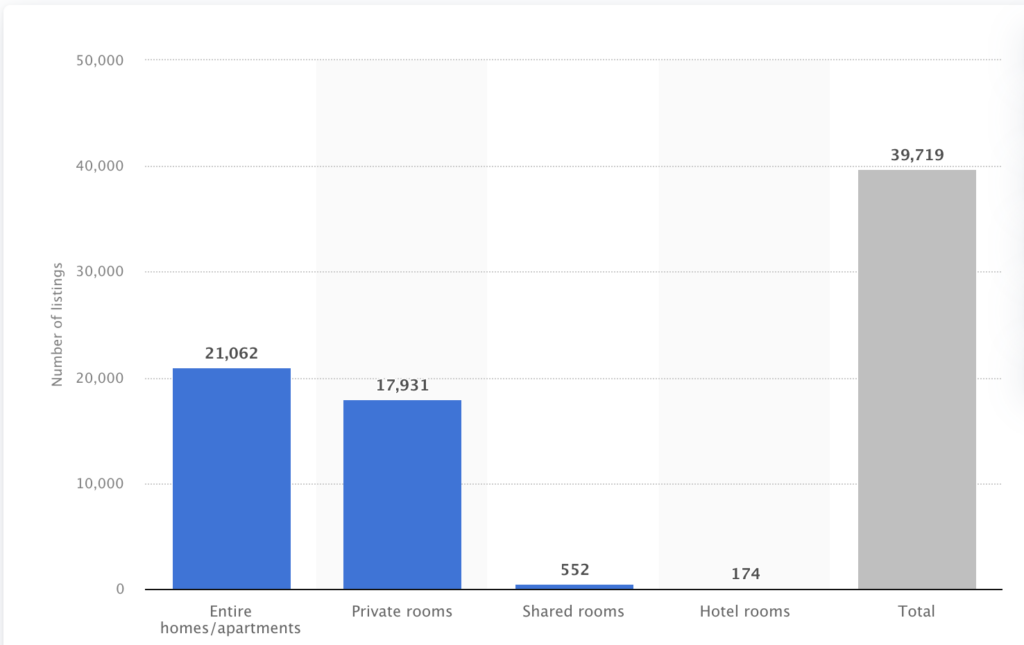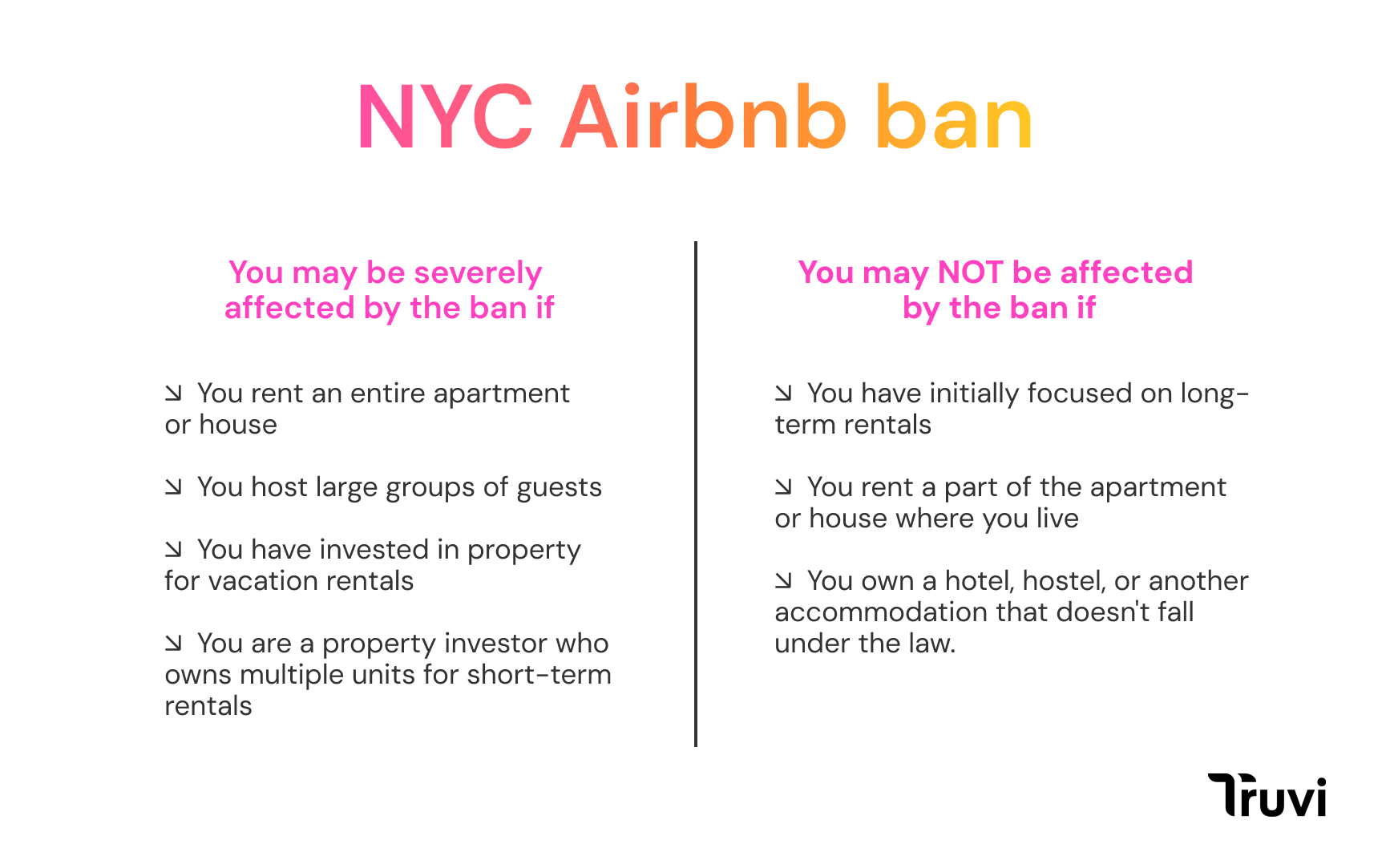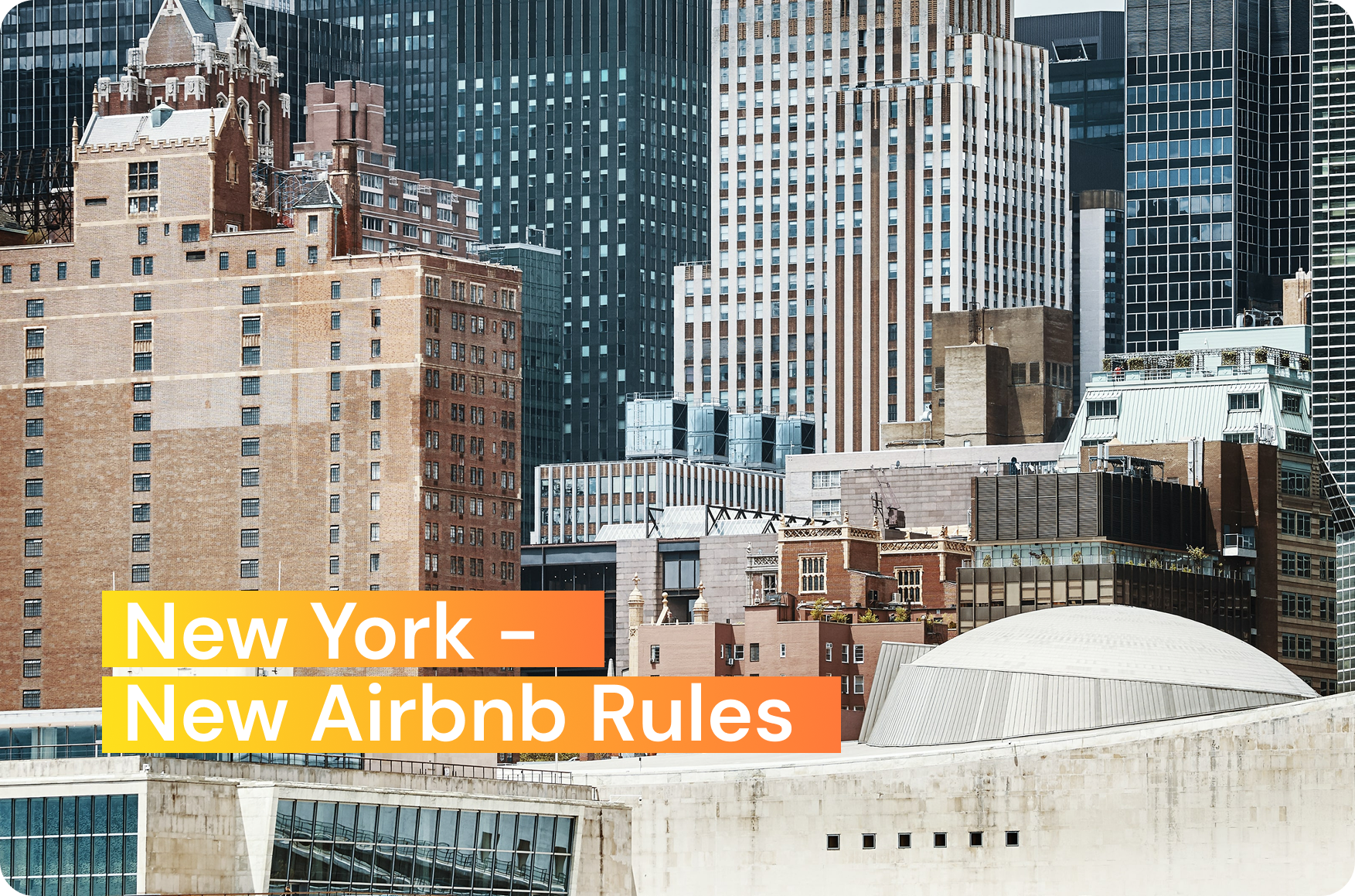Whether you’ve worked hard for several decades to start a short-term rental business in NYC or just inherited a property in Manhattan, you must’ve already thought about renting out. The average annual income per Airbnb property* is around USD 13,500, which inspires many to invest. Yet, short-term rentals in NYC don’t come easy.
The short-term rental registration law adopted on January 9, 2022, limits many property owners from renting their properties short-term. People who pay mortgages with their rental income or have invested in the rental business are looking for alternatives. They can only rent a property they live in and host up to two guests for no more than 30 days.
Learn more about what the new rules for Airbnb in New York City are in our post. We explain whether Airbnb is legal in NYC and how to manage the limitations.
Is Airbnb allowed in NYC?: The short-term rental registration law
Local Law 18, or the Short-Term Rental Registration Law, is also known as NYC Airbnb ban. Many call it a “de facto ban” against short-term rentals and “inherently rational.” After being adopted on January 9, 2022, and coming into effect in 2023, it has caused a wave of lawsuits and protests. But what’s so bad about it? Is Airbnb banned in New York now?
No, Airbnb in NYC is not banned, just like rentals through other booking platforms. Yet the NYC Airbnb ban requires hosts to register with the Mayor’s Office of Special Enforcement (OSE) and prohibits booking platforms, including Airbnb, Booking.com, and Vrbo, from processing payments for non-registered rentals.
Here are the core requirements of Local Law 18:
- Hosts must register their properties using the city’s verification system and get a unique registration number to accept short-term stays (up to 30 days).
- Short-term rental platforms must collaborate with the city and use verification solutions.
- Properties that are not allowed for short-term rentals are included in the prohibited buildings list.
- Non-primary residences cannot be used for short-term rentals.
- Hosts can rent only several rooms, not an entire unit, with no more than 2 guests per room.
- Hosts must be physically present when renting a property short-term.
- Fines of up to $5,000 per violation.

The NYC Airbnb ban is one of multiple short-term rental regulations recently passed globally. Like others, it aims to turn Airbnb rental into sharing property instead of a full-fledged business. The city claims that’s the necessary step to free more properties for long-term rentals and protect the locals from rising prices.
New NYC Airbnb Rules: What’s changed?
It’s time to accept the reality and the fact that if you want to do short-term rentals, you must follow the rules. Here’s how the NYC Airbnb ban affects hosts and the city:
Rental availability and prices
Despite a 92% drop in Airbnb listings, property hasn’t become more available and affordable in New York.
While the city council expected to make the property more available in New York, the impact of the Airbnb ban is still unclear two years later. In August 2024, the median rent for an apartment in Manhattan, the Bronx, Queens, and Brooklyn was $3,425 — a $76 increase compared to 2023. The growing number of properties available for the long term didn’t curb the price rise.
The cost of hotels also keeps increasing as the number of properties available for short-term rentals declines. The prices were 7% higher in 2024 compared to 2023 when the law came into force.
Outer boroughs face financial losses
According to the recent Airbnb report, the NYC Airbnb rules have severely affected outer boroughs. The estimated losses reach $1.6 billion in projected visitor spending and 15,700 fewer jobs.

Given that the number of tourists keeps growing, having reached nearly 65 million visitors in 2024 (a 3.5% increase from 2023), the lack of affordable short-term property may also become an issue.
Hosts must register their property
Now everyone will know how many luxurious houses you own. NYC Airbnb rules introduce mandatory registration of the property you rent within the New York City Department of Buildings (DOB). You must register both full units and separate rooms to get a unique number and include it in the listing.
Rented property must be the host’s primary residence
The Airbnb NYC law has the primary residence requirement. It means hosts must live in the property for most of the year (183 days to be specific) or be its primary resident. How will the city check it? DOB may require you to provide tax returns, utility bills, voter registration records, or other official documents that include your main address. Are Airbnbs allowed in NYC if you don’t live there? No.
Presence during rentals
Even though the law doesn’t make hosts to be present during a rental 24/7, it prohibits renting a separate apartment short-term unless you stay there. So, if you host someone in a separate unit for less than 30 days, you must be there. You cannot just live anywhere else and make money from Airbnb.
If guests stay for over 30 days, there is no need to be present, but it’s already considered a long-term rental, which doesn’t fall under the Short-Term Rental Registration Law. Such a rental is a regular lease governed by landlord-tenant laws.
A limited number of guests
Forget about summer pool parties during the weekends, even if you aren’t very fond of them. The NYC Airbnb ban states no more than two guests can stay at a time. As a result, property owners can no longer accept large groups, and their income may considerably suffer. This limitation protects neighbors from loud parties but significantly affects Airbnb in NYC.
What is the penalty for Airbnb in NYC?
So far, Airbnb has not taken aggressive measures to root out violators. If you search for a separate apartment for a short-term stay, you will find enough options to choose from. Recent statistics show there are still over 21k entire homes/apartments listed on the platform.
Number of Airbnb listings in NYC (Jan 2024)

Number of Airbnb listings in NYC (Jan 2024) Statista
After all, Airbnb is the party interested in easing the new limitations. The company even filed a lawsuit against New York City to block the NYC law but lost it.
According to the Office of Special Enforcement, only listing sites and property owners are penalized. So, if you are a NYC guest, you are 100% safe. If you are a host or property manager, you may face fines for violations.
Who takes the blow for the NYC Airbnb ban?
The good news is some categories of renters won’t feel the impact of the NYC Airbnb ban much. Still not sure whether you are at risk? We can tell you.

NYC Airbnb ban
You may be severely affected by the NYC Airbnb ban if:
- You rent an entire apartment or house.
- You host large groups of guests.
- You have invested in property for vacation rentals.
- You are a property investor who owns multiple units for short-term rentals.
In these cases, the standard Airbnb, being illegal in NYC, won’t allow you to rent as usual. You will likely suffer from financial losses and reduced bookings.
You may NOT be affected by the NYC Airbnb ban if:
- You have initially focused on long-term rentals.
- You rent a part of the apartment or house where you live.
- You own a hotel, hostel, or another accommodation that doesn’t fall under the law.
These categories of renters may even benefit from the ban since New York property prices keep growing. The law has only increased the demand for short-term rental places.
How does the NYC Airbnb ban affect hotels?
NYC hotels are still able to host short-term stays, but must claim a Class B exemption to do so. According to the NYC government, this ruling also applies to lodging houses, rooming houses, boarding houses, boarding schools, furnished room houses, lodgings, club houses, and college and school dormitories, as long as these can be considered what Airbnb calls “traditional accommodation establishments”.
Buildings with a Class B exemption are not required to be registered in the same way Airbnbs are, but they can still be listed in sites like Airbnb.
In order to claim a Class B exemption, you must fill out a Request for Inclusion On, or Removal From, OSE’s Class B Multiple Dwellings List, which can be found on the NYC government site. There, you can also access NYC’s current Class B Multiple Dwellings List.
Short-term rental limitations in other cities
If you already do rentals in other cities or want to expand, you should know that NYC is not the only place with limitations. Banning Airbnb is a new trend in many tourist cities and places with housing troubles. Governments are taking steps to free more properties for locals, which results in strict rules across the US cities and globally.
We have covered how to do short-term rentals in a series of articles. Read about:
- Denver Airbnb rules
- Las Vegas Airbnb laws
- San Diego short-term rentals law
- San Francisco Airbnb laws
- Los Angeles Airbnb laws
- Dallas Airbnb rules
- Atlanta Airbnb laws
- Seattle Short-Term Rental Laws
- San Jose short-term rental laws
In our blog, we also explain the Barcelona short-term rental ban and highlight other important changes affecting short-term rentals.
What can hosts do about the NYC Airbnb ban?
Despite a wave of disagreement and lawsuits, we don’t expect any easing of the rules and regulations in NYC towards short-term rentals. You can still operate short-term rentals in New York through Airbnb with the right approach or consider alternative ways to make money from property. Here are a couple of strategies to adapt:
Learn the rules
You decide whether to play by the rules or not, but at least you must know them. That’s the most obvious step to take. We have mentioned the most critical requirements in our article, and you can additionally consult with an experienced property manager on your case. The ban may not affect you much if you are not a large property management company or an owner with multiple properties.
Be careful with alternative channels for rentals
The NYC Airbnb rules are hard to ignore since they not only relate to Airbnb, but cover all other forms of short-term rentals. Of course, large platforms impose stricter limitations, but you may get fined even if you rent in person. That’s why we recommend thinking twice before renting your property while breaking the rules.
Look for other revenue streams
If you realize you cannot rent your property through Airbnb or other short-term rental platforms, find alternative ways to make money with it. Here are some popular options:
- Switch to mid-term or long-term rentals with a standard lease agreement
- Offer corporate housing for 1-6 months
- Consider a commercial lease if your property is suitable for it
Chances are NYC short-term rental laws will change in the future and become less harsh. So stay flexible and follow the updates. Hopefully, soon, you will be able to rent in NYC with fewer limitations.
Screen your guests
NYC Airbnb rules require more control over who stays in your property and the number of guests. But you should remember that not all guests deserve trust. An occasional big party may happen even with the NYC Airbnb ban, and you will be the one punished for the outcome.
That’s why we recommend using advanced guest verification and guest screening before checking anyone in. You should know who you let into your property and keep them responsible. Use Truvi platform for guest verification, guest screening, and sex offender checks. The platform automates guest ID verification and checks guests against authoritative databases to detect those who can cause trouble.
Does the NYC Airbnb ban affect mid-term and long-term rentals?
In a bit of good news: no, the NYC Airbnb ban does not affect stays of over 30 days. For this reason, Airbnb recommends hosts to switch to a mid-term rental model to keep your NYC Airbnbs operational without further complications. If you are interested in this option, you can learn more about managing mid-term rentals with our articles on the topic.
Summing up: Is Airbnb banned in NYC?
No, Airbnb is not banned in NYC. But the Short-Term Rental Registration Law adopted in 2022 messed up a lot.
New York City Council implemented limitations on STRs which heavily affected hosts and property managers. Despite having good intentions to reduce housing prices and free more property for long-term rentals, the law hasn’t changed much for good. Instead, it has made short-term rentals very challenging, resulting in investors and property owners losing money.
The NYC Airbnb ban doesn’t ban Airbnb and similar STR platforms altogether. You can still rent out your property, but you must register it with the city council and follow other rules we cover in this post. You should also be extra careful with guest screening and let in only the guests who seem trustworthy.



